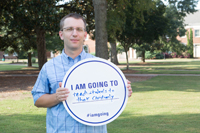Faculty Q and A with David Jones
CHRIS MARTIN | January 19, 2017

 Q: Tell us about yourself.
Q: Tell us about yourself.
A: I’ve been married for 20 years. My wife and I have five children between the ages of three and 13. I’m originally from New Hampshire, but I’ve been in the Virginia and North Carolina area since I was 18. I attended Liberty University for college, Southeastern for seminary, and stuck around for my Ph.D. I’ve been on faculty here since 2001.
Q: How did you come to SEBTS?
A: When I was a student, I really enjoyed my studies and serving on the pastoral staff of a church a friend and I planted about an hour away from campus, so I knew I wanted to teach the Bible in some capacity. My wife was Dr. Paige Patterson’s secretary while I was completing my M.Div., and around that time he asked if I would consider enrolling in the Ph.D. program with the goal of joining the faculty.
Q: When people ask you, “What do you do at Southeastern,” what is your response?
A: I do a number of different things here at Southeastern. I am an Associate Professor of Christian Ethics, the Associate Dean for Graduate Program Administration and the director of the Master of Theology program. But when it comes down to it, I teach the Bible. Since ethics is applied theology, I suppose more specifically, I teach people to apply the Bible to their lives.
Q: On what are you currently working?
A: About a year ago the seminary received a grant to, among other things, develop our offerings on issues related to financial stewardship, economics, wealth, poverty and the like. The focus of my doctoral studies was financial ethics and for the past 10 years I’ve taught a course called “Ethics of Wealth and Poverty.” Because I already had my hand in the discipline, I’ve been involved with the focus of the grant.
Q: What have you been reading recently?
A: I’ve been reading a lot on wealth, poverty and financial stewardship in connection with that program I just mentioned. I’ve been reading a lot about how the church can better equip Christians to think and to minister better when it comes to issues of wealth and poverty.
Q: When you get home from work, what do you look forward to doing?
A: With five children, I’m pretty busy. My kids are all involved in youth athletics. So I have always coached youth sports teams, which I’ve always viewed as a mission field. I’m involved in my local church, and I love teaching the Bible in various ways there.
Q: Who are your role models?
A: As a kid I always looked up to my grandfather. I learned a lot about the Protestant work ethic from him. He taught me the importance of serving other people, being diligent, being on time and overall trying to be consistently good, rather than occasionally great.
Later on, many of my professors, who are now my colleagues, were influential in my life. From history, John Calvin, Martin Luther, the Puritans and the Anabaptists were particularly influential.
Q: What has God been teaching you lately?
A: I’ve been impressed by the need for patience, trusting the Lord despite what may be going on around us. Just because someone rejects the gospel doesn’t mean the Lord isn’t working or won’t work.
Q: Where are some of your former students?
A: I’ve been here long enough that some of my former students are already my colleagues or are teaching at other schools. I enjoy getting emails from around the world form former students who are pastors, missionaries and serving in all other sorts of roles.
Q: When a student completes your class, what do you want him or her to walk away with at the end of the semester?
A: Leaving my ethics courses, I want my students to be equipped to think Christianly in regard to moral topics, and to know how to serve the Lord effectively and spread His Kingdom.
Q: We always say that every classroom at SEBTS is a Great Commission classroom. What does that look like for your class?
A: I hope my students are learning how to engage someone on a moral issue, speak truth and turn that discussion to the gospel. For example, the recent ALS Ice Bucket Challenge has raised conversation about the ethics of medical research. I hope my students can speak truth and turn conversations into gospel conversations.